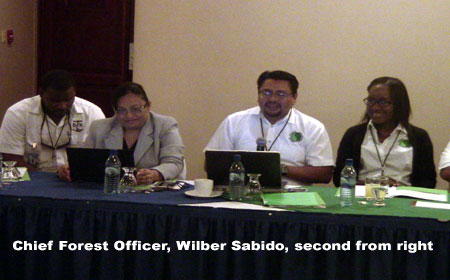BELIZE CITY, Mon. July 25, 2016–Chief Forest Officer Wilber Sabido told Amandala today that the greatest problem with illegal wildlife trafficking in Belize, which also includes trafficking in timber and marine species, is seen along the country’s western and southern borders, which evidently serve as entry points for Guatemalans and Hondurans.
Sabido delivered the opening address this morning at a three-day workshop on illegal wildlife trafficking being held at the Best Western Belize Biltmore Plaza, and which was organized by Wildlife Conservation Society (WCS), which represents a key enforcement and regulatory agency in the fight against illegal wildlife trafficking in Belize.
“We do know that it is a million, billion dollar industry that is highly organized; that is conducted jointly not only with human smuggling, arms smuggling [and] money laundering but it is so organized that it really is a conduit that leads to these other forms of organized crimes and sometimes it is used to finance some of these operations. And so it is important that we recognize that it exists and what are the various forms that it can exist in,” Sabido told Amandala.
We asked Sabido: “Where in Belize do we see the greatest concern with illegal wildlife trafficking?”
“Where we’ve seen it is in the Chiquibul, where we have now a highly organized ring of Guatemalans coming in, illegally logging, illegally poaching and taking back the produce – whether it be, timber or wildlife, live specimens of wildlife into Guatemala and introducing it into the local market there,” he replied.
“As well, we’ve seen an increase in terms of the incursions into the marine realm. We’re talking about sea cucumbers, we’re talking about sharks, we’re also talking about conch, perpetrated by Guatemalans and Hondurans alike,” Sabido added.
Why has it proven challenging for regulatory agencies to tackle the problem? Some critics are of the view that there is a lack of political will, apart from the resource challenges which are often cited by regulatory agencies themselves as a major constraint.
When we shared those sentiments to Sabido, he said that it could be a mix of factors, perhaps the lack of political will, but also resource challenges and furthermore the remoteness of some of the areas being targeted, such as the rugged terrains of the Chiquibul.
Illegal wildlife trafficking is not just a problem in Belize—it is a global problem, and one that is posing even more challenges today to law enforcement agencies around the world. Networking is therefore one of the strategies being used to combat this global problem.
“We need to start the dialogue with respect to illegal wildlife trafficking, which not only includes wildlife in the sense of fauna; it also includes illegal trafficking of timber, and there is already a discussion being had globally,” Sabido told us.
He said that they have been attending a series of regional workshops, including one recently held in Guatemala to talk about the issue in a Central American forum, and another held just last week in The Bahamas, as countries in the Caribbean region try to establish a Caribbean Wildlife Enforcement Network, which Sabido said also recognizes the importance of illegal trafficking of wildlife, especially in the marine realm.
This week’s workshop also draws expertise from the Bureau of International Law Enforcement and Narcotics of the USA.
“It is important, because it is a topic that is not widely discussed, especially involving the regulatory agencies, which are Customs, [the Belize Agricultural Health Authority], BAHA, ourselves [the Forest Department], Fisheries Department… Police, BDF—they need to be aware of what are the different forms of wildlife trafficking,” Sabido added.
Over the course of the next few days, the agencies will hear from presenters on the global, regional and national scope of the problem.
The agencies are also expected to collaborate on the development of a national strategy to combat illegal wildlife trafficking.

